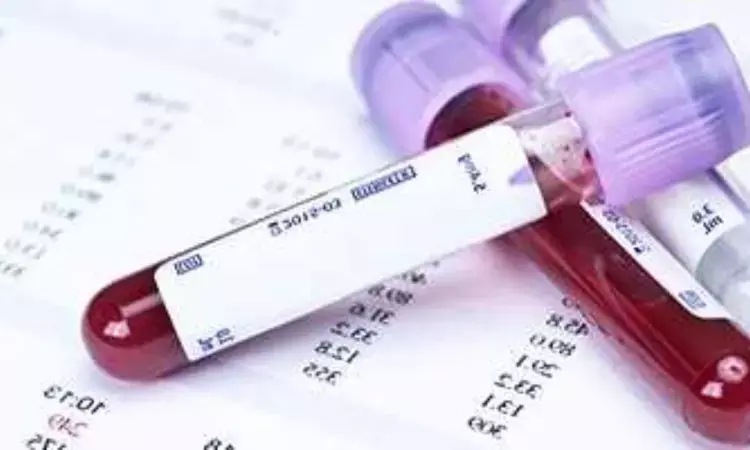- Home
- Medical news & Guidelines
- Anesthesiology
- Cardiology and CTVS
- Critical Care
- Dentistry
- Dermatology
- Diabetes and Endocrinology
- ENT
- Gastroenterology
- Medicine
- Nephrology
- Neurology
- Obstretics-Gynaecology
- Oncology
- Ophthalmology
- Orthopaedics
- Pediatrics-Neonatology
- Psychiatry
- Pulmonology
- Radiology
- Surgery
- Urology
- Laboratory Medicine
- Diet
- Nursing
- Paramedical
- Physiotherapy
- Health news
- Fact Check
- Bone Health Fact Check
- Brain Health Fact Check
- Cancer Related Fact Check
- Child Care Fact Check
- Dental and oral health fact check
- Diabetes and metabolic health fact check
- Diet and Nutrition Fact Check
- Eye and ENT Care Fact Check
- Fitness fact check
- Gut health fact check
- Heart health fact check
- Kidney health fact check
- Medical education fact check
- Men's health fact check
- Respiratory fact check
- Skin and hair care fact check
- Vaccine and Immunization fact check
- Women's health fact check
- AYUSH
- State News
- Andaman and Nicobar Islands
- Andhra Pradesh
- Arunachal Pradesh
- Assam
- Bihar
- Chandigarh
- Chattisgarh
- Dadra and Nagar Haveli
- Daman and Diu
- Delhi
- Goa
- Gujarat
- Haryana
- Himachal Pradesh
- Jammu & Kashmir
- Jharkhand
- Karnataka
- Kerala
- Ladakh
- Lakshadweep
- Madhya Pradesh
- Maharashtra
- Manipur
- Meghalaya
- Mizoram
- Nagaland
- Odisha
- Puducherry
- Punjab
- Rajasthan
- Sikkim
- Tamil Nadu
- Telangana
- Tripura
- Uttar Pradesh
- Uttrakhand
- West Bengal
- Medical Education
- Industry
Hemoglobin Levels Predict Kidney Disease Progression in Diabetes Patients, suggests study

A recent study published in the journal of Diabetes, Metabolic Syndrome and Obesity unveiled critical insights into the role of hemoglobin levels in predicting the progression of diabetic kidney disease (DKD) which is a condition that significantly impacts millions of people globally. This research was conducted on a total of 815 patients with DKD from January 2010 to January 2023 that highlights the intricate relationship between hemoglobin levels and the risk of worsening kidney function, especially in the context of anemia, a common complication of diabetes.
The study by Chen X and team employed a meticulous retrospective cohort analysis to probe the depths of this association. After utilizing advanced statistical models that included Cox proportional hazard regression, this research highlighted on how varying hemoglobin levels influence the renal outcomes, specifically the decline in glomerular filtration rate (GFR) which is a critical measure of kidney function.
The participants were of the average age of 56 years, where males constituted to a 65.4% of the group. The findings revealed that for every unit increase in hemoglobin levels, the risk of reaching the defined renal composite endpoint included a 50% reduction in GFR or the onset of end-stage renal disease (ESRD) that decreased significantly.
A particularly intriguing aspect of the study was the discovery of a nonlinear relationship between hemoglobin levels and the outcomes of kidney health, with an inflection point identified at 109 g/L. This suggests that the protective effect of increased hemoglobin levels on kidney function becomes more pronounced beyond this threshold.
Moreover, the research underscored a gender-specific impact, with male patients showing a more significant association between higher hemoglobin levels and better renal prognosis. This finding could pave the way for tailored treatment strategies that consider the unique physiological differences between genders.
The implications of this study are surplus and positive especially in the population where diabetes remains a leading cause of kidney disease. The identification of hemoglobin as a predictive marker for DKD progression offers the clinicians a valuable tool to manage this complex condition and also emphasize the importance of maintaining optimal hemoglobin levels in diabetic patients.
Reference:
Chen, X., Xie, J., Zhang, Y., Zhang, S., Li, S., Lu, M., Liu, D., He, W., Yau, H., Jia, R., Zhu, Y., & Wang, W. (2024). Prognostic Value of Hemoglobin Concentration on Renal Outcomes with Diabetic Kidney Disease: A Retrospective Cohort Study. In Diabetes, Metabolic Syndrome and Obesity: Vol. Volume 17 (pp. 1367–1381). Informa UK Limited. https://doi.org/10.2147/dmso.s452280
Neuroscience Masters graduate
Jacinthlyn Sylvia, a Neuroscience Master's graduate from Chennai has worked extensively in deciphering the neurobiology of cognition and motor control in aging. She also has spread-out exposure to Neurosurgery from her Bachelor’s. She is currently involved in active Neuro-Oncology research. She is an upcoming neuroscientist with a fiery passion for writing. Her news cover at Medical Dialogues feature recent discoveries and updates from the healthcare and biomedical research fields. She can be reached at editorial@medicaldialogues.in
Dr Kamal Kant Kohli-MBBS, DTCD- a chest specialist with more than 30 years of practice and a flair for writing clinical articles, Dr Kamal Kant Kohli joined Medical Dialogues as a Chief Editor of Medical News. Besides writing articles, as an editor, he proofreads and verifies all the medical content published on Medical Dialogues including those coming from journals, studies,medical conferences,guidelines etc. Email: drkohli@medicaldialogues.in. Contact no. 011-43720751


